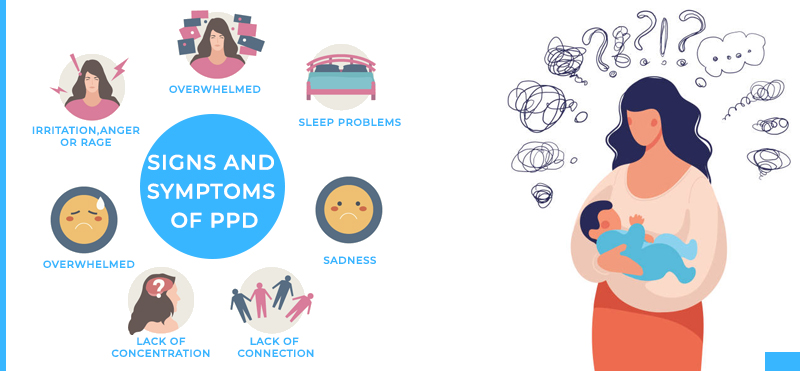Postpartum depression (PPD) is a form of depression that can affect new mothers. It is a serious mental health condition that can impact the way you think, feel, and live your life. Although PPD is common, it’s not something to be embarrassed about or ignore. If you know someone who has postpartum depression, it’s important to understand what it is and how to help them. In this article, you will learn everything you need to know about postpartum depression, including signs and symptoms, risk factors, diagnosis, treatment options, and more.
The postpartum period is a time for new mothers to adjust to their role as a parent. And while PPD can be challenging and overwhelming, it’s important to remember that such conditions don’t define you. Meanwhile, with the right support and treatment options, PPD can be managed effectively.
Read on to learn more about PPD, including its symptoms, risk factors, diagnosis, and treatments.
What Is Postpartum Depression (PPD)?

Postpartum depression is a form of clinical depression that affects women following childbirth or the postnatal period. It usually occurs within the first few months after childbirth and involves symptoms of extreme sadness, fatigue, loss of appetite, trouble sleeping, and suicidal thoughts.
Signs And Symptoms Of PPD
PPD can manifest in several ways. Some common signs and symptoms include:
- Feelings of sadness or hopelessness that don’t seem to go away
- Loss of interest in activities that used to be enjoyable
- Difficulty sleeping, even when the baby is sleeping
- Persistent fatigue and low energy
- Loss of appetite or changes in eating habits
- Feelings of worthlessness or guilt
- Difficulty concentrating or making decisions
- Thoughts of self-harm or suicidal thoughts
Who Is At Risk Of PPD?
Women who have had PPD in the past, those with a family history of postpartum depression, and women who are experiencing stressful life events are more likely to develop it. Moreover, other factors that can increase the risk include lack of support from family and friends, poor physical health post-delivery, financial struggles, and difficulty breastfeeding.
How Is Postpartum Depression Diagnosed?
If you are experiencing symptoms of PPD, it’s important to seek help from a medical professional who can provide an accurate diagnosis and treatment plan. Your doctor will likely ask you questions about your symptoms, medical history, and postpartum experience.
How Is Postpartum Depression Treated?
Treatment for postpartum depression can include medication and counseling. Depending on the severity of your PPD, your doctor may prescribe antidepressants to help manage symptoms. Additionally, talking to a therapist can provide a safe space to discuss feelings, challenges, and concerns related to postpartum depression.
The postpartum period can be both exciting and overwhelming for new mothers. It’s important to recognize the signs and seek help if needed. With the right support system and treatment options, it can be managed effectively.
If you or someone you love is struggling with postpartum depression, there are resources available to help. Reach out to your doctor for a diagnosis and treatment plan, and consider talking to a therapist or joining a postpartum support group. Remember that PPD is common and treatable – you don’t have to go through it alone.
FAQs
How do I combat postpartum depression?
There are a few things you can do to help manage postpartum depression. First, it’s important to seek professional help from your doctor or a mental health provider. A professional can provide an accurate diagnosis and develop a treatment plan tailored to your individual needs. Additionally, talking to a therapist can provide a safe space to discuss PPD and related issues.
Additionally, there are lifestyle changes you can make to help combat PPD. Exercise can help improve your mood, as well as provide some much-needed endorphins and energy.
Why don’t mothers speak about postpartum?
Postpartum depression is still a relatively taboo subject, and many mothers feel ashamed or embarrassed to talk about what they’re going through. This is why it’s important to create an open and understanding environment where it can be discussed without fear of judgment. Encourage postpartum mothers to talk about their feelings and listen without judgment.
What are some early warning signs of postpartum depression?
Some of the most common postpartum depression warning signs include mood swings, unexplained sadness or tearfulness, difficulty sleeping, fatigue and exhaustion, loss of appetite or changes in eating habits, feelings of worthlessness or guilt, difficulty concentrating or making decisions, and thoughts of self-harm. If you notice any of these signs in postpartum mothers, seek help from a medical professional as soon as possible.
